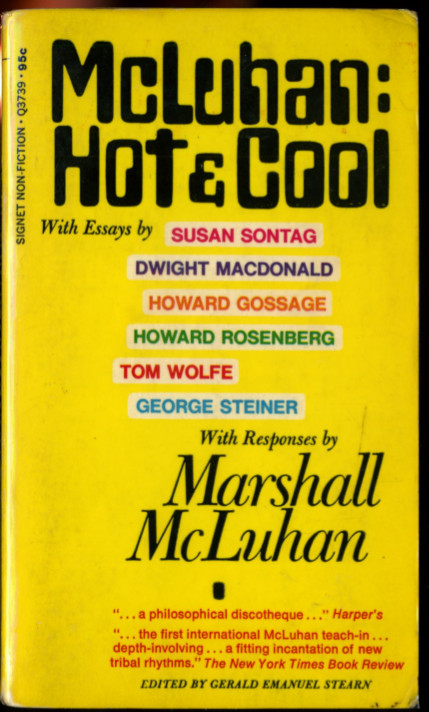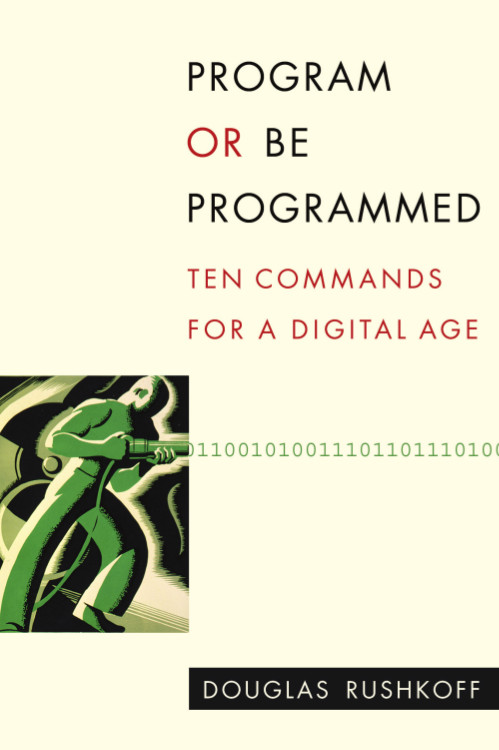Gerald Emanuel Stearn (ed.): McLuhan: Hot & Cool: A Primer for the Understanding of & a Critical Symposium with a Rebuttal by McLuhan (1967)
Filed under book | Tags: · global village, information, literacy, mass media, media theory, photography, print, radio, semiotics, speech, technology, television, text, writing

“A brilliant amalgam of articles, discussions, essays and interviews with and about the Pop Oracle himself, The Complete McLuhan: the most controversial thinker of the electronic age.” (from the back cover)
With essays by Howard Luck Gossage, Tom Wolfe, John Culkin, SJ., Dean Walker, Kenneth E. Boulding, George P. Elliott, Rudolph E. Morris, Walter Ong, SJ., Ammunition (C.I.O.), William Blissett, Harley Parker, Robert Shafer, John Freund, Patrick D. Hazard, Dell Hymes, Frank Kermode, A. Alvarez, Dan M. Davin, Raymond Williams, Harold Rosenberg, Dwight Macdonald, Christopher Ricks, Jack Behar, Ben Lieberman, John M. Johansen, George Steiner, Jonathan Miller, Andrew Forge, Benjamin DeMott, Susan Sontag; responses by Marshall McLuhan; and an interview by Gerald E. Stearn with McLuhan.
Publisher The Dial Press, New York, 1967
Signet Non-Fiction series, Q3739
312 pages
PDF (no OCR)
Comment (1)Richard Sproat: Language, Technology, and Society (2010)
Filed under book | Tags: · language, linguistics, literacy, society, speech, technology, translation, writing

This book traces the history of language technology from writing – the first technology specifically designed for language – to digital speech and other contemporary language systems. The book describes the social impact of technological developments over five millennia, and addresses topics such as the ways in which literacy has influenced cognitive and scientific development; the social impact of modern speech technology; the influence of various printing technologies; the uses and limitations of machine translation; how far mass information access is a means for exploitation or enlightenment; the deciphering of ancient scripts; and technical aids for people with language disabilities.
Richard Sproat writes in a clear, readable style, introducing linguistic and other scientific concepts as they are needed. His book offers fascinating reading for everyone interested in how language and technology have shaped and continue to shape our day-to-day lives.
Publisher Oxford University Press, 2010
ISBN 0199549389, 9780199549382
Length 286 pages
Douglas Rushkoff: Program Or Be Programmed: Ten Commands for a Digital Age (2010)
Filed under book | Tags: · blogging, internet, literacy, media literacy, technology

The debate over whether the Net is good or bad for us fills the airwaves and the blogosphere. But for all the heat of claim and counter-claim, the argument is essentially beside the point: it’s here; it’s everywhere. The real question is, do we direct technology, or do we let ourselves be directed by it and those who have mastered it? “Choose the former,” writes Rushkoff, “and you gain access to the control panel of civilization. Choose the latter, and it could be the last real choice you get to make.” In ten chapters, composed of ten “commands” accompanied by original illustrations from comic artist Leland Purvis, Rushkoff provides cyberenthusiasts and technophobes alike with the guidelines to navigate this new universe.
In this spirited, accessible poetics of new media, Rushkoff picks up where Marshall McLuhan left off, helping readers come to recognize programming as the new literacy of the digital age––and as a template through which to see beyond social conventions and power structures that have vexed us for centuries. This is a friendly little book with a big and actionable message.
Publisher OR Books, 2010
ISBN 1935928155, 9781935928157
149 pages
PDF (PDF, updated on 2012-7-8)
PDF (EPUB, updated on 2012-7-8)

